Using Woodbridge et al’s list of trauma events as a framework, I split these organizations into four broad categories according to the kinds of trauma they address.
1. Experiencing, witnessing, or supporting a loved one who has experienced sexual harassment, assault and/or domestic violence is a trauma that can impact students in school (Woodbridge et al., 2015).1
North Brooklyn Coalition Against Family Violence
The North Brooklyn Coalition Against Family Violence, a coalition formed in 1998 by six community-based organizations, offers a variety of services to survivors of domestic violence and the wider communities of Williamsburg, Bushwick, and Greenpoint. They provide emotional support (therapy, support groups, crisis intervention, psycho-education) and advocacy to survivors, organize community education through workshops for community members and service providers (particularly the New York Police Department), and facilitate community meetings to ensure that the needs of survivors and their families are being met.2
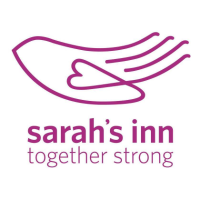
Founded in 1981 by Oak Park residents and based in Chicago, Sarah’s Inn works to support those affected by domestic violence and improve the situation for the future generation. They provide education on domestic violence through the Together Strong Project, (an in school violence prevention education program), the Youth Committee, a group of high school students who gain leadership skills while learning about violence prevention, and trainings that are approved as official by The Illinois Certified Professional Domestic Violence Board. Additionally, Sarah’s Inn supports survivors and current victims with advocacy services from volunteer advocates, legal support, a hotline, and online resources.3
Collective Action for Safe Spaces
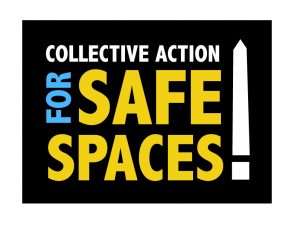 This DC based organization, which began as a blog, aspires to make all people feel safe in public spaces by encouraging citizens to hold each other accountable in order to eliminate sexual harassment and assault. They achieve this mission by educating decision-makers about sexual harassment, publicizing personal testimony from survivors to advocate for more research and policy change, and working with transit authority to develop policy around sexual assault on the Metro. Additionally, Collective Action for Safe Spaces runs Rethink Masculinity workshops that explore and challenge how society constructs masculinity and finally, they facilitate trainings on sexual assault at organizations and workplaces, particularly bars.4
This DC based organization, which began as a blog, aspires to make all people feel safe in public spaces by encouraging citizens to hold each other accountable in order to eliminate sexual harassment and assault. They achieve this mission by educating decision-makers about sexual harassment, publicizing personal testimony from survivors to advocate for more research and policy change, and working with transit authority to develop policy around sexual assault on the Metro. Additionally, Collective Action for Safe Spaces runs Rethink Masculinity workshops that explore and challenge how society constructs masculinity and finally, they facilitate trainings on sexual assault at organizations and workplaces, particularly bars.4
2. The traumas of family fragmentation and incarcerated parents can affect students in schools (Woodbridge et al., 2015).1
 Children of Inmates, one of Hope for Miami’s many programs that aim to better the community of Miami, first locates children of inmates, no easy task given the shame around having a parent in prison. COI then provides the children with crisis support at Coordinated Care Centers, counseling, “mentoring services to reduce the children’s risks for antisocial behaviors and to facilitate their stabilization,” and a means of connecting with their incarcerated parents via prison visits and video calling.5
Children of Inmates, one of Hope for Miami’s many programs that aim to better the community of Miami, first locates children of inmates, no easy task given the shame around having a parent in prison. COI then provides the children with crisis support at Coordinated Care Centers, counseling, “mentoring services to reduce the children’s risks for antisocial behaviors and to facilitate their stabilization,” and a means of connecting with their incarcerated parents via prison visits and video calling.5
Serving the great er Milwaukee area, HOPE Network targets single mothers, building a community, providing education on parenting, and promoting self-reliance. While some services are free, HOPE Network asks that mothers pay a small ($5) annual fee, which gives them access to newspapers and newsletters about parenting, gatherings, events, and outings for mothers and children that foster community, free cribs, and scholarships that cover day-care tuition.6
er Milwaukee area, HOPE Network targets single mothers, building a community, providing education on parenting, and promoting self-reliance. While some services are free, HOPE Network asks that mothers pay a small ($5) annual fee, which gives them access to newspapers and newsletters about parenting, gatherings, events, and outings for mothers and children that foster community, free cribs, and scholarships that cover day-care tuition.6
3. Witnessing or experiencing police violence, militarism, incarceration, and/or punishment based approaches causes trauma that could infiltrate into the schoolhouse (Woodbridge et al., 2015).1
Peoples’ Justices for Community Control and Police Accountability
The coalition that makes up Peopl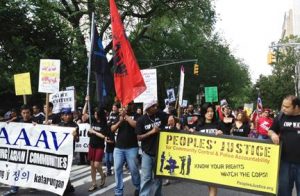 e’s Justice was formed in 2006 in response to New York City Police Department’s killing of Sean Bell, Trent Benefield, and Joseph Guzman. Working primarily in Black, Latino, and Asian communities in New York City, People’s Justice offers Cop Watch training so that this police accountability practice can be implemented in more communities and Know Your Rights trainings in schools, organizations, and community centers. Additionally, People’s Justice facilitates collaborations between NYC artists and community members to create murals and skits that educate and create awareness about police brutality.7
e’s Justice was formed in 2006 in response to New York City Police Department’s killing of Sean Bell, Trent Benefield, and Joseph Guzman. Working primarily in Black, Latino, and Asian communities in New York City, People’s Justice offers Cop Watch training so that this police accountability practice can be implemented in more communities and Know Your Rights trainings in schools, organizations, and community centers. Additionally, People’s Justice facilitates collaborations between NYC artists and community members to create murals and skits that educate and create awareness about police brutality.7
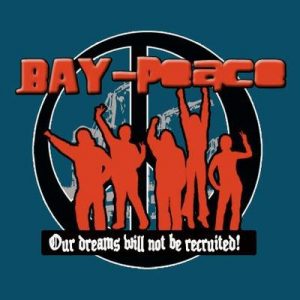
Located in Oakland, BAY-peace recruits “youth action” teams, groups of working class students of color, that work together to address issues such as militarism, racial profiling, and police brutality. Developing their own leadership skills all the while, youth are empowered to spearhead community organizing, lead workshops to educate other youth, and engage in artistic resistance. BAY-Peace also educates youth on their right to opt out of the military after high school.8
Ella Baker Center for Human Rights
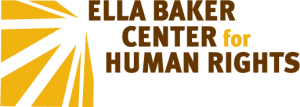 Ella Baker Center, a membership organization based in Oakland, promotes a Truth and Reinvestment approach; they create awareness about prisons, policing, and punishment based approaches and turn victims into leaders that reinvest resources into the community. They do so through campaigns (about jobs not jails and using savings from Proposition 47 for community-based programs, for instance), pushes for policy change (to terminate abusive treatment in jails, for example), and social evenings that foster conversation about public safety. Also, Ella Baker Center is in the process of creating Restore Oakland, an intentionally- planned economic and community hub that provides job opportunities to people of color and formerly incarcerated individuals.9
Ella Baker Center, a membership organization based in Oakland, promotes a Truth and Reinvestment approach; they create awareness about prisons, policing, and punishment based approaches and turn victims into leaders that reinvest resources into the community. They do so through campaigns (about jobs not jails and using savings from Proposition 47 for community-based programs, for instance), pushes for policy change (to terminate abusive treatment in jails, for example), and social evenings that foster conversation about public safety. Also, Ella Baker Center is in the process of creating Restore Oakland, an intentionally- planned economic and community hub that provides job opportunities to people of color and formerly incarcerated individuals.9
4. Illness or injury is a trauma that could affect students at school. Certain illnesses, such as HIV/AIDs and asthma, are prevalent in urban areas (Woodbridge et al., 2015).1
Roxbury Environmental Empowerment Project (REEP)
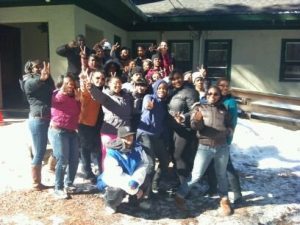 Through youth-run member meetings, campaign committees, community building, organizing training, social events, and retreats, Boston youth fight for environmental justice while gaining leadership skills. One of REEP’s programs, the Asthma-Diesel Campaign, aims to lessen pollution from diesel vehicles that contributes to a childhood asthma epidemic. In their fight for high quality retrofits and enforcement of anti-idling laws, they have convinced Capitol Waste Services to add retrofits to 72 garbage trucks and pushed Boston’s mayor to sign their Diesel Emissions Reduction Ordinance, amongst other victories.10
Through youth-run member meetings, campaign committees, community building, organizing training, social events, and retreats, Boston youth fight for environmental justice while gaining leadership skills. One of REEP’s programs, the Asthma-Diesel Campaign, aims to lessen pollution from diesel vehicles that contributes to a childhood asthma epidemic. In their fight for high quality retrofits and enforcement of anti-idling laws, they have convinced Capitol Waste Services to add retrofits to 72 garbage trucks and pushed Boston’s mayor to sign their Diesel Emissions Reduction Ordinance, amongst other victories.10
 Voices of Community Activists New York
Voices of Community Activists New York
Based in New York, VOCAL-NY has a few areas of focus, one being the empowerment and support of low-income people dealing with HIV/AIDs. VOCAL-NY pushes people with HIV/AIDS to advocate for themselves through Movement Vote, a voter registration, education, and get out-the-vote program and POWER Academy, a leadership development program that gives its students the skills to participate in policymaking relevant to their experiences. VOCAL-NY emphasizes getting to the root causes of the epidemic, such as homelessness and poverty, and thus does work to ensure that funding for supportive housing programs for people with HIV/AIDs are not cut.11
- Woodbridge, M.W., Sumi, W.C., Thornton, S.P., Fabrikant, N., Rouspil, K.M., Langley, A.K., & Kataoka, S.H. (2015). Screening for trauma in early adolescence: Findings from a diverse school district. School Mental Health 8, 89-105.
- What we do. (n.d.). Retrieved April 25, 2017 from http://www.northbrooklyncoalition.org/services/
- Who we are. (n.d.). Retrieved April 25, 2017 from http://www.sarahsinn.org/en/who-we-are/
- Our work. (2017). Retrieved April 25, 2017 from http://www.collectiveactiondc.org/our-work/
- Offering hope to children of incarcerated parents. (n.d.) Retrieved April 25, 2017 from http://www.hopeformiami.org/childrenofinmates
- Home. (n.d.). Retrieved April 25, 2017 from http://www.hopenetworkinc.org/index.php
- About us. (n.d.). Retrieved April 25, 2017 from http://peoplesjustice.org/about
- Home. (n.d.) Retrieved April 25, 2017 from http://www.baypeace.org
- About us. (2017). Retrieved April 25, 2017 from http://ellabakercenter.org/about/about-us
- REEP: Roxbury environmental empowerment project. (n.d.). Retrieved April 25, 2017 from https://www.ace-ej.org/reep
- Our work. (2017). Retrieved April 25, 2017 from http://www.vocal-ny.org/our-work/
Note: All images were taken directly from the organization’s websites, except for the Sarah’s Inn and BAY-Peace logos:
- Sarah’s Inn Logo [photograph]. (n.d.). Retrieved April 27, 2017 from https://www.linkedin.com/company/sarah%27s-inn?trk=company_logo
- BAY-Peace logo [photograph]. (n.d.). Retrieved April 27 from https://twitter.com/baypeace510
